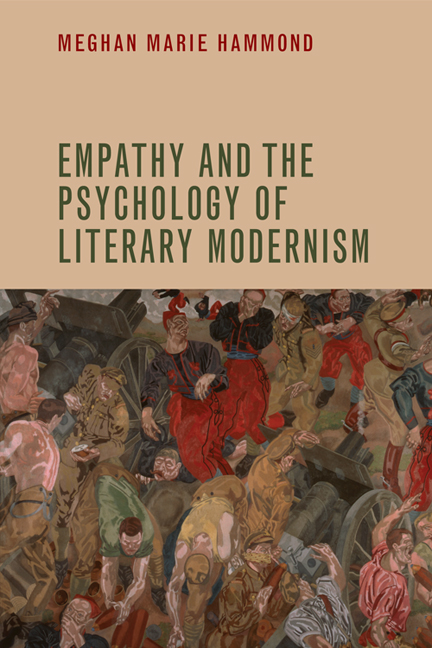Book contents
- Frontmatter
- Contents
- Acknowledgements
- Abbreviations
- Introduction: The Problem of Other Minds and the Fin de Siècle World
- 1 Into Other Minds: William and Henry James
- 2 Dorothy Richardson's Modernist Innovation
- 3 Communities of Feeling in Katherine Mansfield's Fiction
- 4 Empathy and Violence in the Works of Ford Madox Ford
- 5 Virginia Woolf and the Limits of Empathy
- Coda: New Structures of Fellow Feeling
- Bibliography
- Index
3 - Communities of Feeling in Katherine Mansfield's Fiction
Published online by Cambridge University Press: 05 August 2016
- Frontmatter
- Contents
- Acknowledgements
- Abbreviations
- Introduction: The Problem of Other Minds and the Fin de Siècle World
- 1 Into Other Minds: William and Henry James
- 2 Dorothy Richardson's Modernist Innovation
- 3 Communities of Feeling in Katherine Mansfield's Fiction
- 4 Empathy and Violence in the Works of Ford Madox Ford
- 5 Virginia Woolf and the Limits of Empathy
- Coda: New Structures of Fellow Feeling
- Bibliography
- Index
Summary
The fourth volume of Dorothy Richardson's Pilgrimage, 1919's The Tunnel, found an ambivalent reader in her contemporary, Katherine Mansfield. In a review of Richardson's fourth ‘chapter-novel’, Mansfield wrote,
Miss Richardson has a passion for registering every single thing that happens in the clear, shadowless country of her mind. One cannot imagine her appealing to the reader or planning out her novel; her concern is primarily, and perhaps, ultimately, with herself. ‘What cannot I do with this mind of mine!’ one can fancy her saying. ‘What can I not see and remember and express!’ There are times when she seems deliberately to set it a task, just for the joy of realising again how brilliant a machine it is, and we, too, share her admiration for its power of absorbing. (Mansfield 1930: 3)
The implied criticism here – that Richardson is too enamoured of her own mind – has haunted Pilgrimage since the first volume was published a century ago. Mansfield's view of Richardson here highlights a significant difference in the way each writer treats fellow feeling in her respective fiction. While impressed with Richardson's technical skill, Mansfield is bored by the primary literary contribution of Pilgrimage – its singular focus on a unique conscious mind with whom the reader can think and feel over a sustained period. Throughout her own short but fruitful career, Mansfield produced hundreds of fictional minds whose rich interior lives are revealed to us but briefly.
The way Mansfield's thought proliferated into this vast crowd of characters would seem to align her work with Michael Tratner's central thesis in Modernism and Mass Politics. Modernism, he argues, was not a retreat into solipsism or introspection, but rather ‘an effort to escape the limits of nineteenth-century individualist conventions and write about distinctly “collectivist” phenomena’ (Tratner 1995: 3). During her short life Mansfield produced no massive novels – no Dorothea Brookes or Isabel Archers. In that sense, her work certainly makes a cleaner break with the realist past than Richardson's does. Stephen Kern, who allows for multiple understandings of distinctly modernist narrative, also insists that we ought not to equate modernism with the kind of individualised worldview we have seen in Richardson's work. He argues, ‘[w]hile singular focalization narrowed and sharpened vision, other innovative focalizations expanded and varied it’ (Kern 2011: 183).
- Type
- Chapter
- Information
- Empathy and the Psychology of Literary Modernism , pp. 90 - 117Publisher: Edinburgh University PressPrint publication year: 2014



